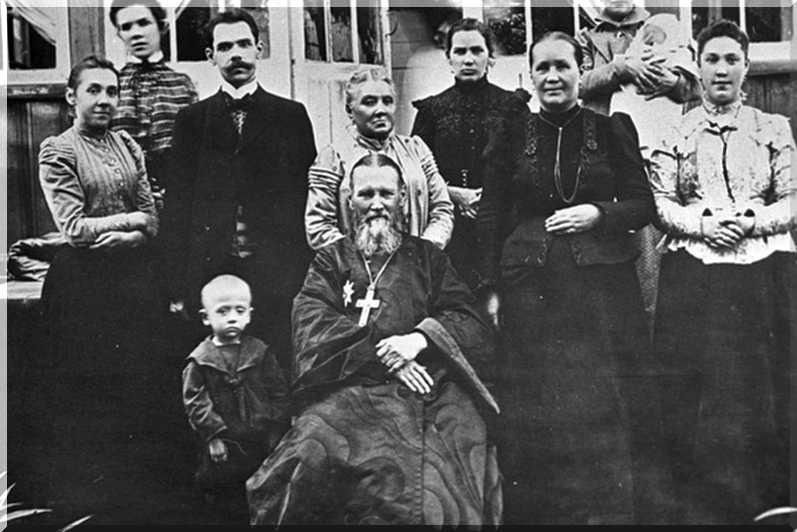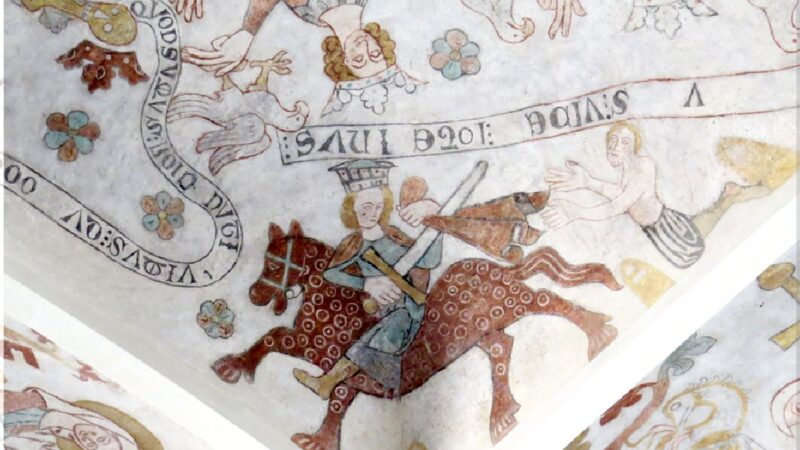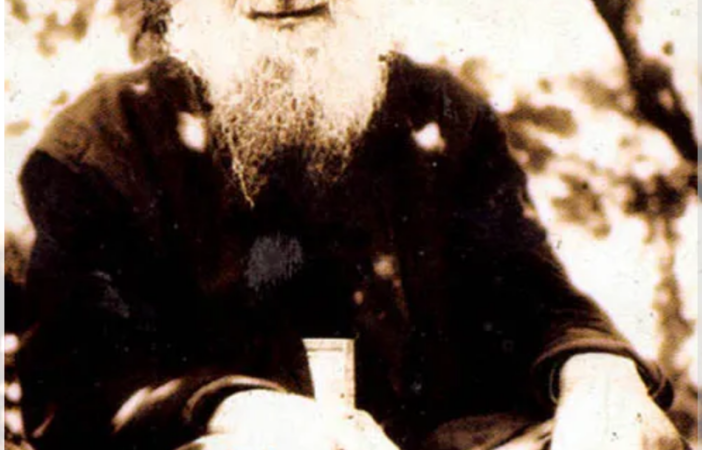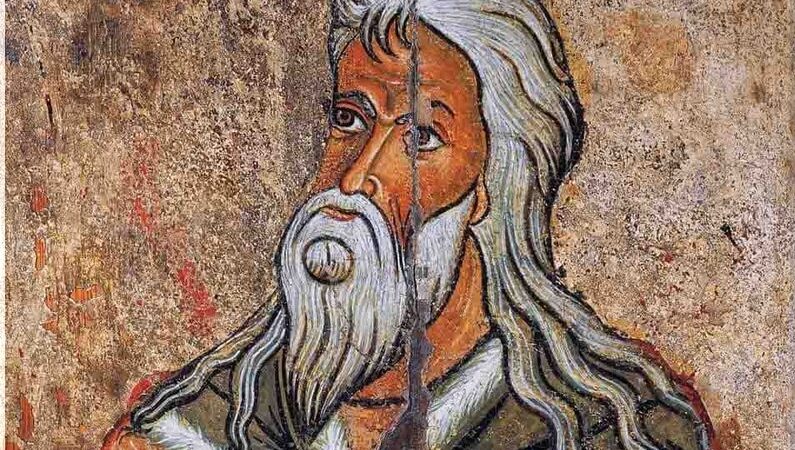St. John of Kronstadt. The Law of Love

“Come to me, all you that labor, and are burdened, and I will refresh you. Take up my yoke upon you, and learn of me, because I am meek, and humble of heart: and you shall find rest to your souls. For my yoke is sweet and my burden light.”
(St Matthew 11:28-30, DRC)
“What is a pure heart? It is meek, humble, guileless, simple, trusting, true, unsuspicious, gentle, good, not covetous, not envious, not adulterous. My soul! remember thy heavenly dignity and do not be disturbed by corruptible, worthless things. Honour also in other people their heavenly dignity, and do not dare offend or hate them for any perishable cause; love with all thy might that which is spiritual and heavenly, and despise that which is material, earthly.”
(John of Kronstadt, “My Life in Christ, or Moments of Spiritual Serenity and Contemplation, of Reverent Feeling, of Earnest Self-Amendment, and of Peace in God”)
Biography
Saint John of Kronstadt, born as Ivan Ilyitch Sergieff, the son of poor peasant folk, was born on the 19th of October 1829 in the little village of Soura, in the province of Arkhangelsk in the far north of Russia. His parents, poor and simple though they were, took great pains with his education, both spiritual and temporal. From school, where he had gone to the top of his class, he went to the seminary. From there he was sent in 1851, at government expense, to the Theological Academy of Saint Petersburg. While he was there his father died, and it was with great thankfulness to God that he accepted the post of registrar.
Having considered becoming a monk, and going to eastern Siberia as a missionary, he came to the conclusion that there were many people around him as unenlightened as any pagan, and he decided to work for their salvation, after a dream in answer to prayer, in which he saw himself officiating in some unknown cathedral.
Soon after completing his studies he married Elisabeth, daughter of the Archpriest K. P. Nevitzki, and he was ordained priest in December 1855. Appointed as assistant priest at Saint Andrew’s Cathedral, Kronstadt, when he entered it for the first time he recognized it as the church he had seen in his dream; and there, first as curate, and afterwards as rector, he served throughout the fifty-three years of his ministry. Cherishing a lofty ideal of the priestly vocation, he continued nightly to study and pray that he might perfect himself in it, while during the day he devoted himself to the many poor of his parish.
Father John, whose predecessors, apparently, had hardly even dared to penetrate the worst parts of the town, spent much of his time there, striving to heal bodies and souls alike, attracting to himself first the children, and then, through them, their parents. Often he found no time to eat until the late evening, and even then he would sometimes be summoned out again, and not return before the small hours; he gave away his own shoes, he gave away the housekeeping money: his wife gradually accustomed herself to it, and finally became something like his keeper.
In 1857 he was invited to teach the scripture in the municipal school at Kronstadt, and he accepted with joy, for he loved children, and always took great pains with them. When his fame had spread and he was constantly visiting Saint Petersburg, then to his own, his colleagues and pupils great regret, he was forced to abandon his teaching post.
Another object of Father John’s concern and labor was the removal of the widespread poverty that afflicted Kronstadt. At first he gave these beggars money for food and shelter, but he soon came to see that this was not merely useless, but positively harmful. In 1868 he conceived the idea of founding a House of Industry, comprising a number of workshops, a dormitory, a refectory, a dispensary, and a primary school. He formed a committee, and appealed for funds. His appeal was answered by rich and poor from all over Russia, and the House of Industry was founded in 1873. Father John administered a total of over $25,000 a year in numerous charities, half of it in Kronstadt.
There is an attractive power in the personality of Father John of Kronstadt, in his portrait, the magnetism of his writings, and in his diary My Life in Christ. There is a peaceful and consoling quality in the notes of his diary, not to mention the very subjects of his talks, which spiritually exalt, uplift, and strengthen.
“The Christian has no reason to have in his heart any ill-feeling whatever against anyone–such ill-feeling, like every other evil, is the work of the Devil; the Christian must only have love in his heart; and as love cannot think of evil, he cannot have any ill-feeling against others.”
(St. John of Kronstadt)
The Law of Love
(by St. John of Kronstadt. Translated by Nun Cornelia)
The Holy Evangelist Luke speaks in today’s Gospel about the teaching and commandment of our Lord Jesus Christ about how we should be with people in society, so that we might please both God and people, make also a good name for ourselves, have a good conscience, and be made worthy of the promised, incorruptible Heavenly Homeland for our wise behavior in our earthly homeland1(Lk. 6:31:36).
What wise, lofty, saving, and truly divine teachings and commandments!
But how badly our daily life conforms to them! The Lord teaches us to treat people as we would have people treat us; that is, simple-heartedly, well-wishing, sympathetically, patiently. He set our own selves as a measuring stick for our relationship to other people; and this measuring stick, this scope, is love. For no man ever yet hated his own flesh; but nourisheth and cherisheth it, even as the Lord the church2(Eph. 5, 29).
But in community it often happens to the contrary—peoples’ relationships to each other are often quite wrong, not distinguished by a spirit of simplicity and sincerity, love and good will, love of peace, meekness and condescension, purity and holiness, sympathy and compassion, and Christian patience. They are often distinguished by a spirit of insincerity and duplicity, coldness and haughtiness, deceit and ill will, or impurity and sensuality, low egoism and self-seeking.
The root, cause, or source of one or another way of treating one person or another is within a person’s heart. A good man out of the good treasure of the heart bringeth forth good things: and an evil man out of the evil treasure of his heart bringeth forth evil things3(Mt. 12:35). This occurs either from his natural character traits, or from an either good or bad upbringing; from various passions, inclinations, or habits—for example, of seeking certain pleasures; from either good or bad examples; from life circumstances; from more or less comfortable material standards; from the milieu in which he lives or his standing in society; from various life lessons or trials; and finally, from how much he has been or not been penetrated with the Gospel spirit of Christ.
Thus, the measuring stick of relationships to others is simplicity and sincerity, good will, and love for all—this is the best side of relationships to others. But not rarely, the nature of relationships to others is cunning, suspicion, dislike, rudeness, envy, extreme selfishness, self-seeking, partiality, vanity, ambition, vainglory, sensuality, or extreme haughtiness; that is, a high opinion of one’s self, which seeks to humiliate others.
In general, we can observe more insincere relationships amongst people than pure-hearted ones, because the whole heart is infected to a greater or lesser extent with the impurity of sin, covered with the corruption of the passions. For, Who can say: My heart is clean, I am pure from sin?4(Prov. 20:9), say the Scriptures. Therefore, some words are smooth as oil, and yet they are poison darts. Thus, according to the teaching of our Savior, the measure of our relationships to others should be correct love for our own selves. As we would like others to treat us, so shall we treat them—that it, simply, pure-heartedly, meekly, lovingly, trustingly, condescendingly, sympathetically, patiently.
The Lord offers Himself as an example to us, and we should ceaselessly look at it and learn from it. Learn of me, He says, because I am meek, and humble of heart5(Mt. 11:29). The Apostle Paul says, Follow peace with all men, and holiness, without which no man shall see the Lord6(Heb. 12:14). He also teaches, Let love be without dissimulation… Be kindly affectioned one to another with brotherly love; in honour preferring one another…
Distributing to the necessity of saints (that is, to you brother Christians); given to hospitality. Bless them which persecute you: bless, and curse not. Rejoice with them that do rejoice, and weep with them that weep.
Be of the same mind one toward another. Mind not high things, but condescend to men of low estate.
Be not wise in your own conceits. Recompense to no man evil for evil. Provide things honest in the sight of all men. If it be possible, as much as lieth in you, live peaceably with all men.
Dearly beloved, avenge not yourselves, but rather give place unto wrath: for it is written, Vengeance is mine; I will repay, saith the Lord. Therefore if thine enemy hunger, feed him; if he thirst, give him drink… Be not overcome of evil, but overcome evil with good.Let every soul be subject unto the higher powers7(Rom. 12:9-21; 13:1).
These are the rules of behavior for Christians amongst themselves, which the Apostle Paul wrote for us in his epistle to the Romans. Each of us is equally obligated to uphold them. Where is the highest motivation for us to treat each other this way?
In the image and likeness of God, in which man is created, and in that we are the children of the One Heavenly Father, members of Christ, branches of the one vine of Christ, sheep of His one rational flock. We partake of the one life bread of Christ, and drink from the same chalice of His divine Blood. We have drunk of the same Holy Spirit, and we await the same incorruptible, eternal inheritance. This is our motivation for mutual, sincere, loving relationships!
For if ye love them which love you, says the Lord in today’s Gospel, what thank have ye? for sinners (that is, idolaters), also love those that love them. And if ye do good to them which do good to you, what thank have ye? for sinners also do even the same; that is, as long as they receive benefit, which means that they love only themselves—for they only love in their benefactors the benefit they receive.
And if ye lend to them of whom ye hope to receive, what thank have ye? for sinners also lend to sinners, to receive as much again, and in this case you love only yourself, your own gain, and not the benefit of others, and do not satisfy his need perfectly. If Christians do not fulfill these natural virtues, then they are much worse than pagans, who do by nature the things contained in the law8(Rom. 2:14), not having the power of grace; while Christians, as we know, have received all things that pertain unto life and godliness, through the knowledge of him that hath called us to glory and virtue9(2 Pet. 1:3), for the fulfillment of all Christ’s commandments.
Look, Christian, into the mirror of the divine commandments and know what you are. Do you at least love those who love you? Or do you not even love them at times? Do you do good to your benefactors? Do you lend to those who pay back loans? Do you tend towards self-interest and lack of trust?
Many want to be satisfied with love only for those who love them, and do not want to force themselves to love those who hate them, or who have animosity toward them. Oh Christian, with such pagan love you will stand ashamed at the Last Judgment. But love ye your enemies, the Lord continues, and do good, and lend, hoping for nothing again; and your reward shall be great, and ye shall be the children of the Highest: for he is kind unto the unthankful and to the evil. It would seem that our Savior is giving us a difficult task by commanding us to love our enemies and to do good to them. The corrupt human heart says, “This is impossible, this is against nature and common sense!” It is really only difficult for the corrupted heart, a heart not renewed or strengthened by grace. But for the heart reborn by grace, this is an easy thing, for the Lord helps the believer in everything; and we can see many such examples in the lives of the saints.
But to whom should we give, not expecting anything in return?
To poor people, those of lowly station, for whom repaying a debt is extremely difficult and often impossible. But wealthy people should always repay their debts; lenders do not sin if they seek repayment of debt by honest means or lawsuits. Otherwise, this would be harmful pandering to unconscionable people, who think to get rich easily at the expense of others. Be ye therefore merciful, says the Lord, as your Father also is merciful. The Lord requires mercy from Christians, His children by grace, like unto the mercy of the Heavenly Father.
Truly, if Christians are the children of the Heavenly Father, bought with the blood of His Son, and they are promised incorruptible, eternal blessedness in the Heavenly Homeland, then they should manifest love and mercy in this life towards their brothers, corresponding in greatness to the love and mercy which God has toward them, and to the boundless greatness of incorruptible blessings, the great honor and heavenly crowns that have been promised them.
Beloved, if God so loved us, we ought also to love one another, says the holy Apostle John the Theologian10(1 Jn. 4:11). Amen.
“Russia has forgotten the saving God; it has lost faith in Him, abandoned the Law of God, enslaved itself to all sorts of passions, deified blind human reason. It has replaced God’s all-wise, holy and righteous will with the phantom of sinful freedom, opened wide the doors to all manner of outrage, and therefore it will become immeasurably impoverished, and be shamed before the whole world—the worthy reward for its pride, for its slumber, inaction, venality, and coldness toward God’s Church. God will punish us for our sins; the Sovereign Lady will not stretch forth her hand to help us. Russia can be called a kingdom of the Lord. This is of course on the one hand. On the other, because of their godlessness and impiety many Russians, the so-called intelligentsia who have strayed from the right path, apostatized from the faith and mock it in every way, having trampled upon all the Gospel commandments and allow all kinds of depravity into our life—the Russian kingdom is not the Lord’s kingdom but a broad and far-flung kingdom of satan…”
(From the prophecies of St. John of Kronstadt)
Short Prayers.
(14 of June, the commemoration of st. John of Kronstadt, homily of Fr. Raphael).
Readings:
2 Chronicles 14:11-12
Proverbs 30:7-9
St Matthew 8:23-27
Romans 5:10-16
In the Name of the Father and of the Son and of the Holy Spirit, one God. Amen. Dear beloved, let us remember St Justin the Philosopher and other martyrs with him in Rome, and also father among the saints, St John of Kronstadt. Saints Justin, Chariton, Charita, Euelpistus, Hierax, Peon, Valerian and Justus, and St John of Kronstadt, pray for us!
St Justin of Rome wrote this famously, “Whosoever is able to proclaim Truth and does not proclaim, that one will be condemned by God.” Let us remember this holy father among the saints and his admonition, that when we face people with ears to hear and hearts that are tender, that we are to share the Truth with them, so that they too, will be able to be illumined by the Light and Love of God.
Today also marks the glorification of St John of Kronstadt in 1990, a saint of the Russian Church.
The righteous saint reminded us that the world will pass away11(1 John 2:17), “You follow the events of the external world, reading secular compositions, magazines and newspapers. Do not lose sight of your internal world, your soul; it is both nearer and dearer to you. From henceforth, read the Holy Gospels and the writings of the Holy Fathers ever more often; it is sinful for a Christian not to read Divinely-inspired works.”
The world is transient, and we are often reminded to be conscious of the internal world. Prayer is to be conscious of our internal world. And yet, what is prayer?
Prayers can be what we joyously sing in unison during the Divine Liturgy and other Church services. Prayers can be what we humbly submit to God. Prayers can also be actions for the sake of others without any selfish agenda.
The evil one hates prayers, especially those who are faithful to God. The more we pray to God, the more the evil one will attempt to tempt and seduce us away from God. The evil one has little care for those who do not believe in God, or for those with little faith. And yet, when we begin to step ever closer and closer to our God out of penitence and prayer, then the evil one will get more ferocious in his efforts to kick us off the orbit we attempt to center around God. As we reflect on St Matthew 8:23-27, we saw how the disciples of Christ could also be tempted with despair when faith disappears.
St John of Kronstadt mentioned in his homilies, that we will face moments of deadly darkness and spiritual anguish when we pray. We are not to falter or become disheartened during such times, even if we face darkness and a feeling of being cut off from God, because such darkness is from the evil one and our passions.
Remember that God’s Light will always be constant towards us, and through His Church, and His entire creation. The Truth of God will never fail, even if we become blind to His Truth when we face darkness.
When we face such darkness, make the Sign of the Cross, invoking the Holy Name of Christ our Lord, in the name of the Father, the Son, and the Holy Spirit. Pray the Holy Name of Christ our Lord asking for mercy. Remember that simple prayers with wholeheartedness is better than uttering thousands of words without belief.
When we read the Old Testament, such as 2 Chronicles 14:11-12, we see that King Asa pleaded with God for victory, and God granted that victory.
Does that mean that we are to pray only for selfish results, or that God can be swayed by mere words?
No.
God in the Old Testament seemed to grant many miracles and positive results, simply because of His love for His children. He knows all things past to the future, and He is in complete control. God grants what would appear to us, with terrible shortsightedness, to be our wishes sometimes. But it is truly His Will when specific things happen, or other things happen, or nothing happens. God so love us that Jesus Christ our Lord came for our salvation, and the Holy Spirit our comforter as well. Therefore, it would please God when we begin to pray simply, pray from the heart, and pray for the love of others. In Proverbs 30:7-9, we are reminded that we can pray to God for a simple life that will enable us to have our mind and hearts encircle around God and our lifelong pursuit of Him.
Therefore, pray simply, for a simple prayer can reach God when we are sincere, such as when we call, “Lord Jesus Christ, Son of God, have mercy on me, a sinner”.
Let us close by praying the thanksgiving prayer:
It is truly meet to call thee blest, the Theotokos, ever blessed and most pure, and the Mother of our God. More honorable than the Cherubim, and more glorious than the Seraphim, without corruption thou gavest birth to God the Word: True Theotokos, we magnify thee.
O virgin Theotokos, rejoice; O Mary full of grace, the Lord is with thee. Blessed art thou among women, and blessed is the fruit of thy womb, for thou hast borne the Savior of our souls, Jesus Christ our Lord. Amen.






